In the untold wonders of the world, we delve into the inspiring tales of seniors venturing beyond boundaries, redefining travel through backpacking adventures.
Backpacking is a form of independent travel where individuals journey with their belongings packed into a backpack. It typically involves traveling on a budget, staying in hostels, camping, or using other low-cost accommodations. Backpackers often prioritize cultural immersion, adventure, and authentic experiences over luxury amenities.
“Adventure knows no age limit; it only requires a willing heart and an open mind.”
Anonymous
Common Misconceptions about Backpacking in Later Life
There are prevalent misconceptions surrounding backpacking in later life, primarily due to stereotypes and societal norms. Some of these misconceptions include:
- Physical Limitations: Many believe that older adults may not have the physical ability to engage in backpacking due to age-related health issues.
- Financial Constraints: Some seniors may perceive backpacking as financially impractical, assuming it requires significant financial resources or is only suitable for younger travelers.
- Safety Concerns: Concerns about safety, particularly regarding solo travel, may deter seniors from considering backpacking as a viable option.
- Lack of Comfort: There’s a misconception that backpacking involves sacrificing comfort and convenience, which may not be appealing to older adults seeking leisurely travel experiences.
Purpose of the Blog: Encouraging Seniors to Embrace Backpacking
The primary aim of this blog is to challenge these misconceptions and inspire seniors to view backpacking as an enriching and accessible form of travel. The blog seeks to:
- Empower Seniors: By providing information, resources, and practical tips, the blog aims to empower seniors to overcome barriers and embark on backpacking adventures confidently.
- Promote Health and Well-being: Highlighting the physical and mental health benefits of backpacking, the blog encourages seniors to stay active, engaged, and adventurous.
- Encourage Cultural Exploration: Emphasizing the cultural immersion and personal growth opportunities inherent in backpacking, the blog aims to ignite seniors’ curiosity and sense of adventure.
- Offer Practical Guidance: Through comprehensive guides, destination recommendations, and preparation tips tailored to seniors’ needs, the blog aims to equip readers with the knowledge and confidence to pursue backpacking as a viable travel option.
Overall, the blog seeks to foster a mindset shift, encouraging seniors to embrace backpacking as a fulfilling and enriching way to explore the world, regardless of age.
Benefits of Backpacking for Seniors
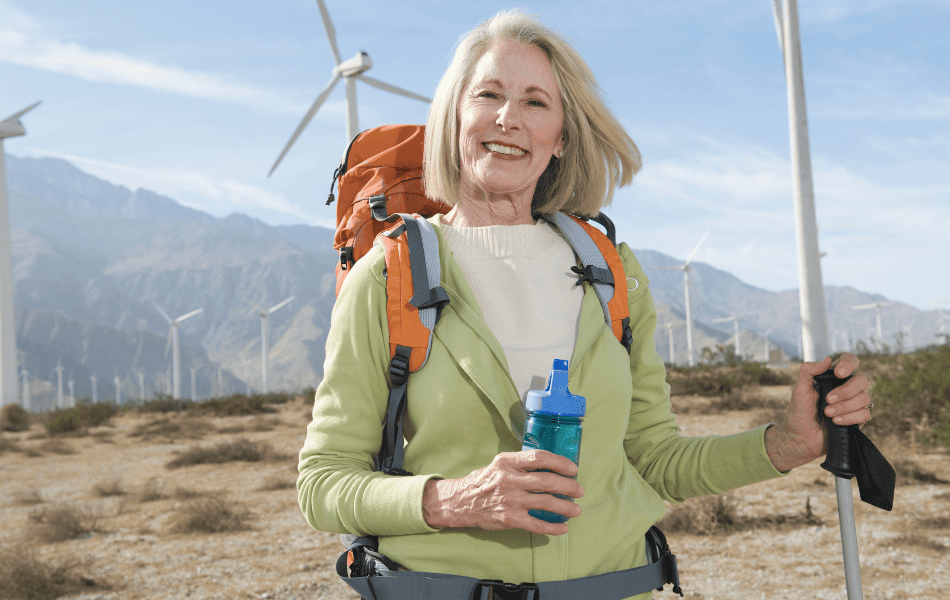
Physical Health Benefits
Engaging in backpacking as a senior offers numerous physical health benefits. Firstly, it provides an excellent opportunity for exercise and fitness. Whether it’s hiking through scenic trails, exploring vibrant city streets on foot, or swimming in crystal-clear lakes, backpacking inherently involves physical activity. These activities not only promote cardiovascular health but also help improve strength, flexibility, and endurance. Additionally, the outdoor environment and fresh air contribute to overall well-being, enhancing seniors’ physical vitality and energy levels.
Moreover, backpacking positively impacts seniors’ mental well-being. The immersive nature of backpacking, surrounded by awe-inspiring landscapes and diverse cultures, can significantly reduce stress and anxiety. Being away from the hustle and bustle of daily life allows seniors to disconnect from technology, reconnect with nature, and find solace in the simplicity of the backpacking experience. This mental rejuvenation fosters a sense of peace, contentment, and mindfulness, contributing to improved mental health and emotional resilience.
Financial Advantages
Backpacking offers significant financial advantages for you seeking budget-friendly travel options. Firstly, accommodations such as hostels, guesthouses, or camping sites are often more affordable than traditional hotels or resorts. Backpackers have the flexibility to choose accommodations that suit your budget, preferences, and comfort levels, allowing you to stretch your travel budget further. Additionally, backpacking promotes resourcefulness and creativity, enabling seniors to discover unique and cost-effective lodging options, such as homestays or community-based accommodations.
Furthermore, backpacking facilitates cost-effective transportation choices. You can explore destinations via public transportation, such as buses, trains, or ferries, which are typically more economical than private transportation options. Additionally, backpackers can opt for shared rides, carpooling, or even walking, reducing transportation expenses while fostering a deeper connection with the destination. By prioritizing budget-conscious travel choices, you can maximize your travel experiences without overspending, making backpacking an accessible and sustainable option for exploring the world.
Cultural Immersion and Personal Growth
Backpacking provides seniors with unparalleled opportunities for cultural immersion and personal growth. Through interactions with locals, participation in cultural activities, and exploration of historical sites, you can gain a deeper understanding and appreciation of diverse cultures and traditions, also you can make an impact. Unlike conventional tourist experiences, backpacking allows you to engage authentically with local communities, fostering meaningful connections and cross-cultural exchange. Backpacking allows you to do the non-touristy things.
Moreover, backpacking promotes increased self-confidence and adaptability among seniors. Navigating unfamiliar environments, overcoming language barriers, and embracing new experiences encourage you to step out of your comfort zone and embrace the unknown. By challenging yourself and embracing uncertainty, you can cultivate resilience, resourcefulness, and a sense of accomplishment. These personal growth experiences not only enhance your confidence in your abilities but also broaden your perspectives, fostering a greater sense of empathy, tolerance, and open-mindedness toward others and the world around you.
“Backpacking as a senior is not about reliving the past; it’s about creating new memories for the future.”
Michael Anderson
Preparing for Backpacking as a Senior
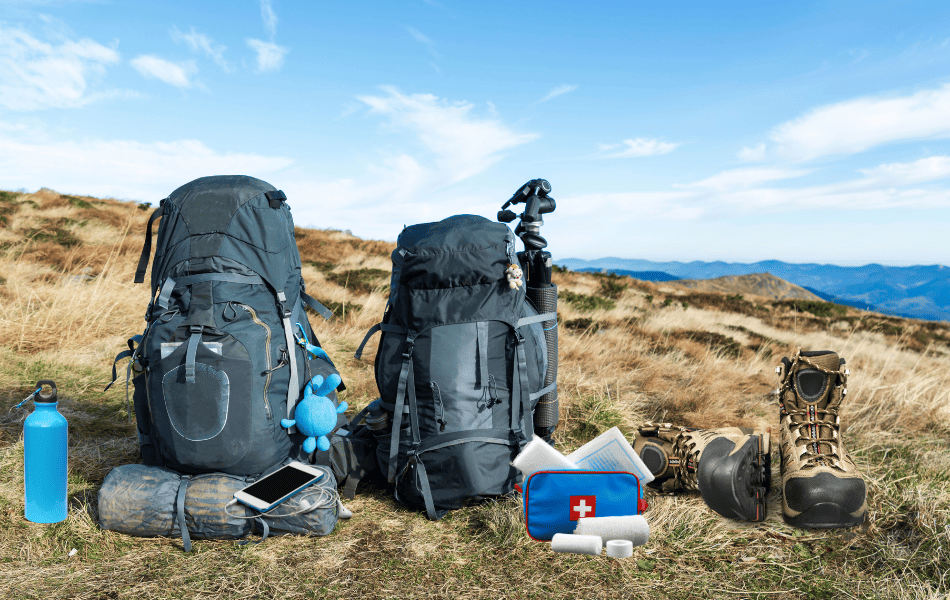
Assessing Physical Capabilities and Limitations
Before embarking on a backpacking adventure, seniors need to assess their physical capabilities and limitations. This involves consulting with healthcare professionals, such as physicians or physical therapists, to ensure they are fit for travel. Healthcare professionals can provide valuable insights into any pre-existing medical conditions, medications, or mobility concerns that may impact travel plans. Based on their recommendations, you can make informed decisions regarding the feasibility of backpacking and take necessary precautions to safeguard your health and well-being.
Additionally, seniors should carefully consider choosing suitable destinations and itineraries that align with their physical abilities and interests. Opting for destinations with varied terrain and moderate difficulty levels allows you to challenge yourself while minimizing the risk of overexertion or injury. Moreover, selecting flexible itineraries with ample rest days and manageable distances ensures you can pace yourself accordingly and enjoy a balanced travel experience without feeling rushed or overwhelmed.
Packing Essentials for Comfort and Safety
Packing wisely is crucial for seniors to ensure comfort, safety, and convenience during their backpacking journey. Lightweight gear recommendations are particularly beneficial, as they reduce the physical strain of carrying heavy loads while maximizing mobility and agility. You should prioritize lightweight and compact equipment, such as a lightweight backpack, sleeping bag, tent, and clothing made from moisture-wicking and quick-drying materials.
In addition to camping gear, you should pack essential medication and health supplies to manage any existing health conditions or unexpected medical emergencies. This includes prescription medications, over-the-counter medications (such as pain relievers and antihistamines), first-aid kits, and personal medical information (such as allergies, medical history, and emergency contacts). Carrying an adequate supply of medications ensures you can maintain your health and well-being while traveling and mitigate potential risks associated with limited access to healthcare services in remote areas.
Planning for Emergencies
Preparing for emergencies is essential for undertaking backpacking adventures. Seniors should carefully consider travel insurance options that provide comprehensive coverage for medical emergencies, trip cancellations, and evacuation services. Travel insurance offers peace of mind and financial protection against unforeseen circumstances, ensuring you can access medical care and assistance in the event of illness, injury, or other emergencies.
Furthermore, you should compile emergency contact information, including local emergency services, embassy or consulate contact details, and personal emergency contacts. It’s advisable to keep this information readily accessible, either in a physical travel document or stored digitally on a smartphone or portable device. By proactively planning for emergencies and staying prepared, you can navigate potential challenges with confidence and resilience, enabling yourself to fully enjoy your backpacking experience while prioritizing your safety and well-being.
“The world is your playground, no matter how many wrinkles you have.”
Carol Starkey
Tips for Enjoyable Senior Backpacking

Pace Yourself and Listen to Your Body
One of the most important tips for seniors commencing a backpacking adventure is to pace themselves and listen to their bodies. It’s essential to recognize the importance of rest and recovery, particularly when undertaking physically demanding activities such as hiking or trekking. You should prioritize regular breaks, hydration, and adequate sleep to prevent exhaustion and minimize the risk of injury or overexertion. Additionally, adjusting itineraries as needed allows you to adapt to their energy levels and physical capabilities, ensuring a more enjoyable and sustainable travel experience.
Embrace the Backpacker Community
Seniors can enhance their backpacking experience by embracing the backpacker community. Connecting with fellow travelers of all ages fosters a sense of camaraderie, mutual support, and shared experiences. You should actively seek opportunities to engage with other backpackers, whether it’s striking up conversations in hostels, joining group activities, or participating in communal meals. Building connections with like-minded individuals not only enriches the travel experience but also provides valuable opportunities for friendship, cultural exchange, and learning from others’ experiences.
Flexibility and Open-Mindedness
Flexibility and open-mindedness are key attributes for seniors undertaking a backpacking adventure. Embracing spontaneity allows you to seize unexpected opportunities, explore off-the-beaten-path destinations, and discover hidden gems along your journey. You should be open to serendipitous encounters, unplanned detours, and new experiences that may arise during your travels.
Moreover, being adaptable to unexpected situations, such as changes in weather, transportation delays, or accommodation issues, enables you to navigate challenges with grace and resilience. By embracing flexibility and open-mindedness, you can cultivate a sense of adventure, curiosity, and appreciation for the unpredictability of travel, making your backpacking experience all the more memorable and fulfilling.
| The best book ever to purchase before venturing out is the The Backpacker’s Bible: Your Essential Guide to Round the World Travel | The best book ever to purchase before venturing out is The Backpacker’s Bible: Your Essential Guide to Round the World Travel |
Destinations Ideal for Senior Backpackers
European Hiking Trails
Europe offers a plethora of scenic hiking trails that are ideal for senior backpackers seeking adventure, cultural immersion, and breathtaking landscapes. Among these trails, these standout options are the Camino de Santiago in Spain, the Tour du Mont Blanc, spanning France, Switzerland, and Italy, Samaria Gorge, Crete, Greece; Durmitor National Park, Montenegro and Veluwe National Park, the Netherlands.
1. Camino de Santiago, Spain
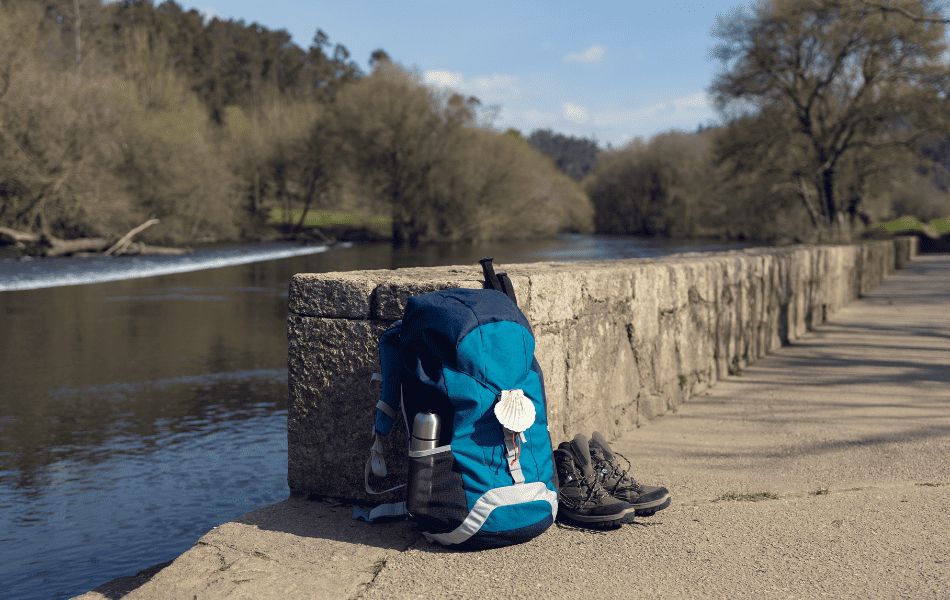
The Camino de Santiago, also known as the Way of Saint James, is a network of pilgrimage routes leading to the shrine of the apostle Saint James the Great in the Cathedral of Santiago de Compostela in Galicia, Spain. The most popular route, the Camino Francés, traverses diverse landscapes, charming villages, and historic towns, offering a profound cultural and spiritual experience for backpackers of all ages.
Seniors embarking on the Camino de Santiago can choose from various starting points and route lengths, allowing for flexibility and customization based on individual preferences and physical capabilities. Along the trail, pilgrims encounter a supportive community of fellow travelers, welcoming locals, and pilgrim hostels (albergues) offering affordable accommodation and communal meals.
The Camino de Santiago is renowned for its rich cultural heritage, stunning architecture, and spiritual significance, making it a transformative journey for senior backpackers seeking personal growth and reflection. Whether walking the entire Camino or completing shorter sections, seniors can immerse themselves in the beauty of the Spanish countryside, savor local cuisine, and forge lasting connections with fellow pilgrims from around the world.
2. Tour du Mont Blanc, France/Switzerland/Italy
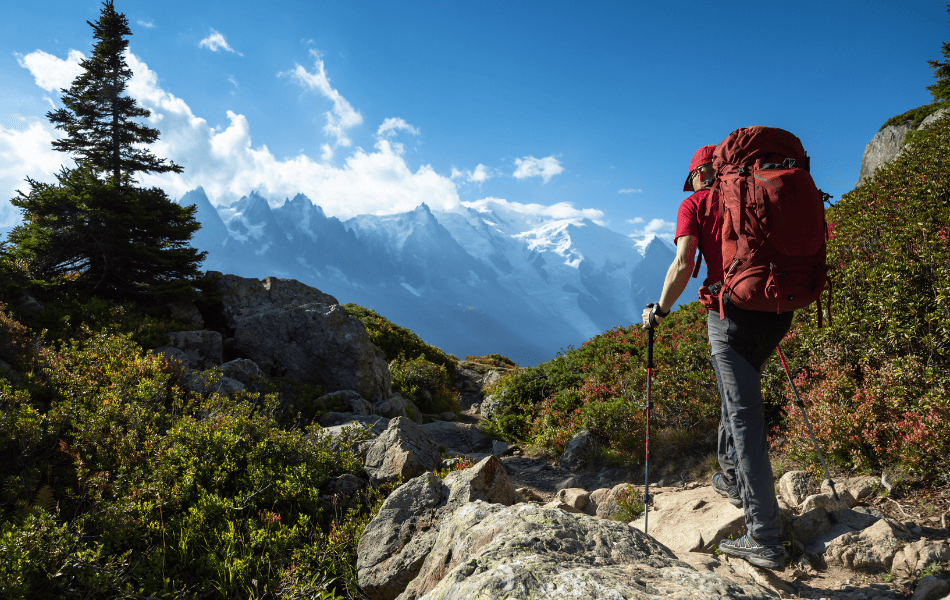
The Tour du Mont Blanc is a legendary trekking route encircling the majestic Mont Blanc massif, the highest peak in the Alps. Spanning approximately 170 kilometers (105 miles) through France, Switzerland, and Italy, this iconic trail offers breathtaking alpine scenery, charming mountain villages, and unparalleled views of snow-capped peaks, glaciers, and pristine lakes.
Senior backpackers undertaking the Tour du Mont Blanc can expect a challenging yet rewarding adventure, with opportunities to hike through alpine meadows, traverse high mountain passes, and marvel at towering peaks. The trail is well-marked and serviced by a network of mountain huts, refuges, and picturesque villages, providing comfortable accommodation, hearty meals, and warm hospitality along the way.
While the Tour du Mont Blanc requires a moderate level of fitness and stamina, seniors can tailor their itinerary to suit their pace and preferences, with options for shorter day hikes or rest days to enjoy the surrounding natural beauty. Whether admiring the panoramic vistas from the Col du Bonhomme or savoring traditional Alpine cuisine in quaint mountain refuges, senior backpackers on the Tour du Mont Blanc are sure to create cherished memories and unforgettable experiences amidst the splendor of the European Alps.
3. Samaria Gorge, Crete, Greece
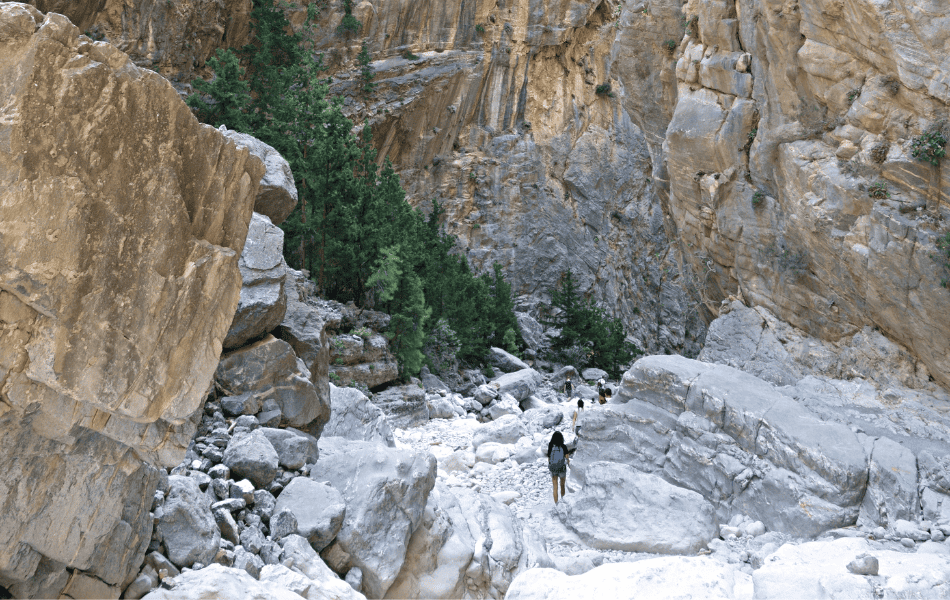
For senior backpackers seeking a less strenuous hiking experience in Greece, the Samaria Gorge in Crete offers a picturesque and relatively accessible trek through stunning natural scenery. The Samaria Gorge is one of Europe’s longest gorges, stretching over 16 kilometers (10 miles) and descending from the Omalos Plateau to the coastal village of Agia Roumeli.
4. Durmitor National Park, Montenegro
In Montenegro, Durmitor National Park provides an excellent destination for senior backpackers seeking scenic beauty and cultural immersion. The park encompasses rugged mountains, deep river canyons, and pristine glacial lakes, offering a variety of hiking trails suitable for all fitness levels. When I ventured there, it was mid-winter, covered in snow, and just amazing!
5. Veluwe National Park, the Netherlands
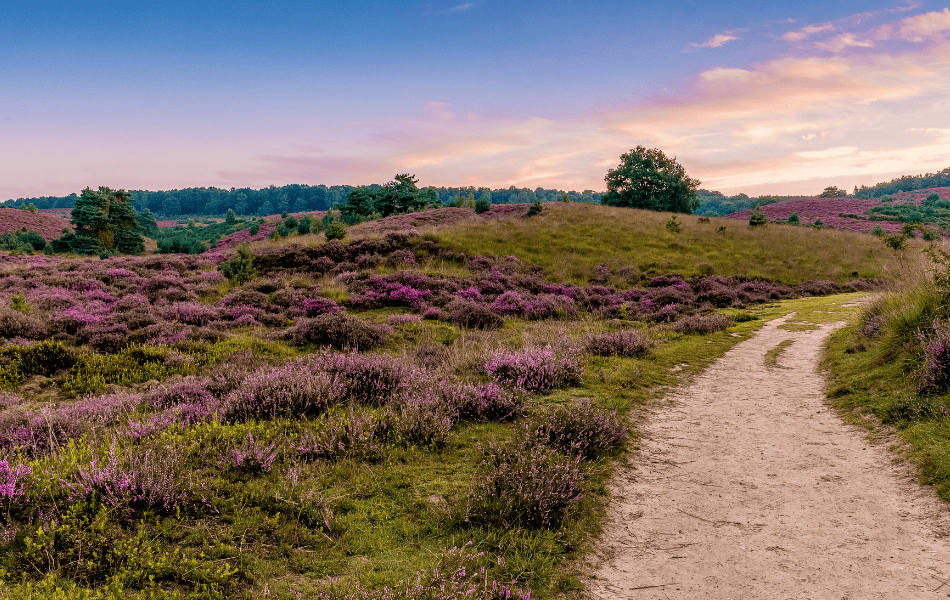
In the Netherlands, Veluwe National Park offers a serene setting for senior backpackers to explore diverse landscapes, including forests, heathlands, and dunes. The park features an extensive network of hiking and cycling trails, allowing visitors to immerse themselves in nature while observing wildlife and enjoying the peaceful surroundings.
Overland Track, Tasmania, Australia
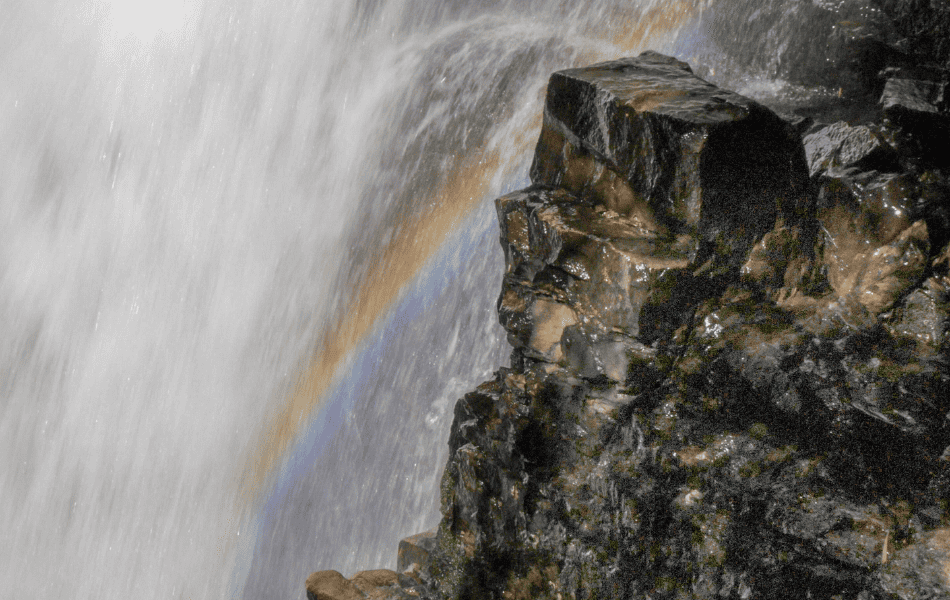
For senior backpackers seeking a unique and scenic hiking experience, the Overland Track in Tasmania, Australia, offers an unforgettable adventure through ancient rainforests, alpine meadows, and dramatic mountain landscapes. Spanning approximately 65 kilometers (40 miles) from Cradle Mountain to Lake St Clair, the Overland Track is one of Australia’s premier multi-day hiking trails, showcasing the pristine wilderness of the Tasmanian wilderness world heritage area.
With well-equipped huts, designated campsites, and experienced guides available, seniors can safely embark on this iconic trek, immersing themselves in the natural beauty and tranquility of Tasmania’s rugged wilderness.
National Parks and Wilderness Areas
Backpacking in National Parks offers seniors unparalleled opportunities to immerse themselves in nature’s grandeur, rejuvenate their spirits, and embrace adventure. From tranquil lakeshores to rugged mountain trails, these pristine wilderness areas provide a sanctuary for exploration, reflection, and unforgettable experiences amidst breathtaking scenery.
1. Plitvice Lakes National Park, Croatia
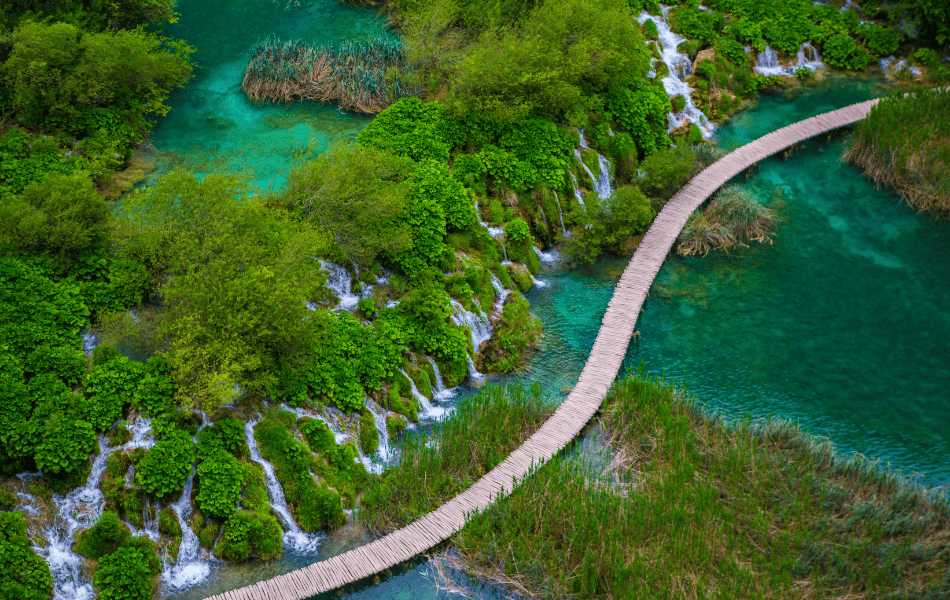
Nestled in the heart of Croatia, Plitvice Lakes National Park is a UNESCO World Heritage site renowned for its cascading waterfalls, crystal-clear lakes, and lush forested landscapes. Senior backpackers seeking tranquility and natural beauty will find solace in the park’s network of scenic trails, which wind through breathtaking scenery and offer panoramic viewpoints of the park’s iconic attractions.
With well-maintained pathways and wooden boardwalks, exploring Plitvice Lakes is accessible for seniors of varying fitness levels. Whether meandering alongside turquoise lakes or marveling at the emerald-green hues of the waterfalls, senior backpackers in Plitvice Lakes National Park are sure to be enchanted by the park’s serene ambiance and timeless beauty.
2. Cairngorms National Park, Scotland
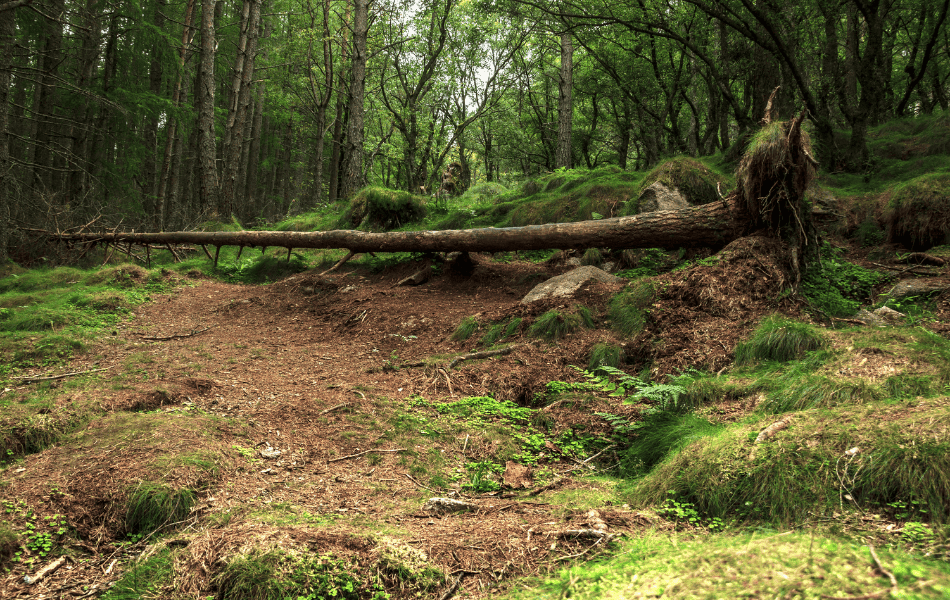
Cairngorms National Park, located in the Scottish Highlands, is a vast wilderness area renowned for its rugged mountain terrain, ancient Caledonian forests, and abundant wildlife. Senior backpackers seeking adventure and solitude will find ample opportunities for exploration amidst the park’s dramatic landscapes and scenic vistas. With a network of well-marked trails catering to all abilities, seniors can enjoy leisurely walks through picturesque glens, tranquil lochs, and heather-clad moors.
For those seeking a more immersive experience, guided walks and wildlife tours offer insights into the park’s rich natural heritage, including encounters with red deer, golden eagles, and elusive Scottish wildcats. Whether admiring the panoramic views from atop Cairn Gorm Mountain or wandering through ancient pine forests, senior backpackers in Cairngorms National Park are sure to be captivated by the park’s wild beauty and rugged charm.
3. Lake District National Park, England
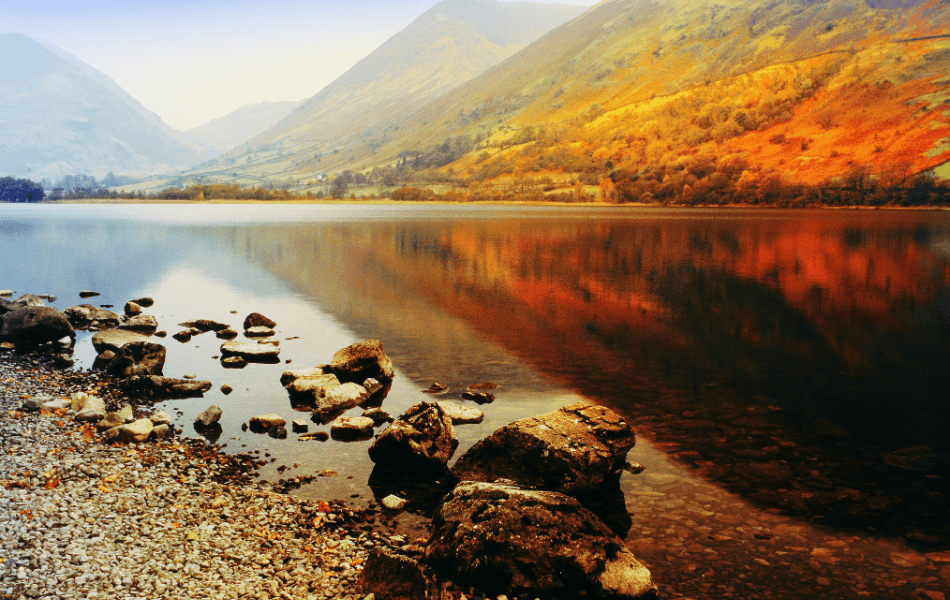
Situated in the northwest corner of England, the Lake District National Park is a scenic paradise renowned for its shimmering lakes, verdant valleys, and rugged fells. Senior backpackers seeking tranquility and inspiration will find solace amidst the park’s timeless landscapes and picturesque villages. With a network of well-maintained trails ranging from gentle lakeside strolls to challenging mountain hikes, seniors can explore the park at their own pace, immersing themselves in the beauty of the English countryside.
For those seeking cultural enrichment, the Lake District is dotted with historic landmarks, literary sites, and charming market towns, providing opportunities for leisurely exploration and cultural immersion. Whether cruising on Lake Windermere, ascending the summit of Scafell Pike, or savoring a traditional cream tea in a quaint tearoom, senior backpackers in the Lake District National Park are sure to be enchanted by the park’s timeless allure and natural splendor.
“Exploring the world as a senior is not about reaching the destination; it’s about embracing the journey.”
Jane Diddle
Overcoming Age-Related Challenges
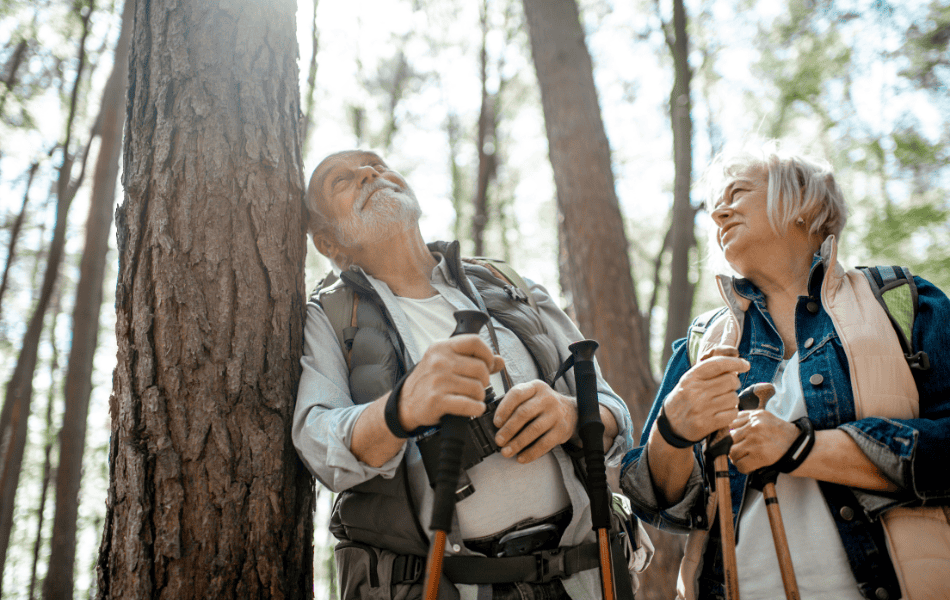
Addressing Concerns about Safety
Seniors engaging in backpacking adventures can address concerns about safety by conducting thorough research into crime rates and travel advisories for their chosen destinations. Prioritizing destinations with favorable safety records and staying informed about potential risks enables seniors to make informed decisions and mitigate potential dangers. Additionally, when traveling solo, seniors can take precautions such as staying in well-lit areas, avoiding secluded areas at night, and staying vigilant of their surroundings to enhance personal safety and security.
Coping with Physical Limitations
If you have physical limitations you can overcome challenges by seeking out accessible accommodations and transportation options that cater to your needs. Prioritizing accommodations with accessible facilities, such as ramps, elevators, and grab bars, ensures comfort and convenience during your stay. Likewise, utilizing technology and travel aids, such as mobility scooters, walking sticks, or GPS navigation devices, empowers seniors to navigate unfamiliar environments with confidence and independence, enhancing their overall travel experience.
“You’re never too old to wander, explore, and discover the beauty of our world.”
Sarah Williams
Conclusion
Questions Asked

- “Are there age restrictions for seniors to go backpacking?”
- Generally, there are no official age restrictions for seniors to go backpacking; it’s more about individual capabilities and health considerations.
- “What are some unique challenges seniors face while backpacking?”
- Seniors may encounter challenges like adapting to new sleeping arrangements, managing medications, or dealing with mobility issues, requiring careful planning and preparation.
- “How can seniors ensure their safety while backpacking alone?”
- Seniors can enhance their safety by sharing their itinerary with trusted contacts, carrying communication devices, and staying informed about local conditions and emergency protocols.
- “What are the best backpacking destinations for seniors with limited mobility?”
- Destinations with accessible trails and amenities, such as national parks with paved paths or urban areas with public transportation, can provide enjoyable experiences for seniors with limited mobility.
- “How can seniors manage the physical demands of backpacking at higher altitudes?”
- Seniors can acclimatize gradually, stay hydrated, and listen to their bodies while backpacking at higher altitudes to minimize the risk of altitude-related illnesses like altitude sickness.
2 thoughts on “Backpacking Beyond Youth: Exploring the World as a Senior”
Comments are closed.
Recent Posts
Discover Peartree Serviced Apartments Salisbury, once the Clovelly Hotel, a pet-friendly, stylish stay near the cathedral, station and Wiltshire’s top sights. Some places simply give you a bed...
Discover insider tips to find cheap flights from the UK, save on easyJet, Ryanair & BA, and score the best weekend and last-minute deals. Why You’re Paying Too Much for Flights Most UK...


Ready to put a pack on my back… Thank you for the article.
I have read so many posts regarding the blogger lovers however this paragraph is in fact a
pleasant piece of writing, keep it up.